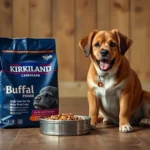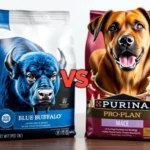
Dog nutrition is a critical aspect of pet ownership that significantly affects the health and well-being of our furry friends. Among the plethora of dog food brands available, Mighty Dog food has long been a popular choice for many pet owners. However, recent changes and concerns have sparked discussions about what happened to Mighty Dog food and its impact on canine nutrition. This article will explore the intricacies of dog nutrition, the history and formulation of Mighty Dog food, recent controversies, and how these factors influence the health of our pets.
Understanding Dog Nutrition
The Basics of Canine Nutrition
A well-balanced diet is vital for dogs to thrive. Essential nutrients include:
- Proteins: Crucial for growth, maintenance, and repair of tissues.
- Fats: Provide energy and support cellular function.
- Carbohydrates: Serve as an energy source and aid in digestion.
- Vitamins: Vital for various bodily functions, including immune response.
- Minerals: Important for bone health and metabolic processes.
A balanced diet ensures that dogs receive the necessary nutrients to maintain optimal health, energy levels, and overall quality of life.
Common Myths About Dog Nutrition
Many misconceptions about dog nutrition persist. For example, it’s commonly believed that dogs are strictly carnivores, but they are actually omnivores and can benefit from a variety of foods. Another myth suggests that raw diets are inherently superior; however, these diets can pose risks, including bacterial contamination and nutritional imbalances. It’s essential to consult with veterinarians to debunk these myths and make informed decisions about your dog’s diet.
Overview of Mighty Dog Food
History of Mighty Dog Food
Mighty Dog food has been a staple in the pet food market since its inception. Originally created to provide high-quality nutrition for dogs, the brand quickly gained popularity among pet owners. Over the years, Mighty Dog food expanded its product line, offering various formulas to meet the needs of different breeds and life stages.
Ingredients and Formulations
Mighty Dog food typically includes a mix of meat, grains, and vegetables. Common ingredients found in their formulations are:
- Meat by-products: A source of protein but can be controversial regarding quality.
- Corn and wheat: Often used as fillers, these ingredients can lead to allergies in some dogs.
- Vitamins and minerals: Added to ensure a balanced diet.
While Mighty Dog food provides some nutritional benefits, it also has drawbacks, especially concerning the quality of certain ingredients. Understanding these factors is crucial for making informed choices.
Recent Changes and Controversies
Shift in Production or Ownership
In recent years, Mighty Dog food has undergone changes in production and ownership, raising questions among loyal customers. These shifts can impact product consistency and quality, leading to concerns about whether the food is still meeting the high standards that pet owners expect.
Consumer Concerns and Recalls
There have been reports of recalls associated with Mighty Dog food, primarily due to contamination concerns. Such incidents can create distrust among consumers, leading to negative reviews and feedback. Monitoring these developments is essential for pet owners who prioritize their pet’s health and safety.
Comparison with Competitors
When considering what happened to Mighty Dog food, it’s crucial to compare it with other popular dog food brands. Some competitors offer higher-quality ingredients, transparent sourcing practices, and better overall nutritional profiles. Key differences include:
- Ingredient quality: Some brands use whole meats without fillers.
- Price points: Mighty Dog food may be more budget-friendly, but this comes at a potential cost in quality.
- Consumer trust: Brands with fewer recalls and positive reviews often inspire more confidence among pet owners.
The Impact of Diet on Dog Health
Common Health Issues Linked to Diet
Poor nutrition can lead to various health issues in dogs, including:
- Obesity: Overfeeding or poor-quality food can lead to an overweight dog, increasing the risk of joint problems and diabetes.
- Allergies: Some dogs may develop allergies due to specific ingredients, leading to skin irritations and digestive issues.
- Digestive Problems: Low-quality ingredients can upset a dog’s stomach, causing vomiting and diarrhea.
Choosing the right food is crucial in preventing these health concerns and ensuring long-term well-being.
Case Studies: Dogs and Their Diets
Real-life examples illustrate the impact of diet on dog health. For instance, a pet owner shared how their dog, previously fed low-quality kibble, experienced chronic digestive issues. After transitioning to a premium brand with high-quality ingredients, the dog’s health improved significantly, showcasing the importance of proper nutrition.
Recommendations for Dog Owners
Evaluating Dog Food Brands
When assessing dog food brands, consider the following tips:
- Read labels carefully: Look for whole meats as the first ingredient and avoid vague terms like “meat by-products.”
- Check for AAFCO approval: Ensure the food meets the standards set by the Association of American Feed Control Officials, indicating it provides complete nutrition.
- Research brand reputation: Seek out reviews and reports on recalls to gauge the brand’s reliability.
Transitioning to a New Dog Food
When switching to a new dog food, it’s essential to do so gradually to prevent digestive upset. Here’s a step-by-step guide:
- Start with a mix: Combine 25% of the new food with 75% of the old food.
- Increase the new food ratio: Gradually increase the new food to 50%, then 75%, and finally to 100% over a week.
- Monitor your dog’s response: Keep an eye on your dog’s digestion and health throughout the transition.
Consulting with Professionals
Veterinarians and pet nutritionists play a crucial role in guiding pet owners towards the best dietary choices. Regular check-ups can help monitor your dog’s health, ensuring that any dietary adjustments are beneficial and necessary.
Conclusion
Mighty Dog food has been a significant player in the canine nutrition space, but recent changes and controversies have raised questions about its quality and reliability. Understanding the nuances of dog nutrition is essential for making informed decisions about your pet’s diet. As pet owners, staying updated on changes in dog food brands and ongoing research in pet nutrition will empower us to provide the best care for our four-legged companions.









